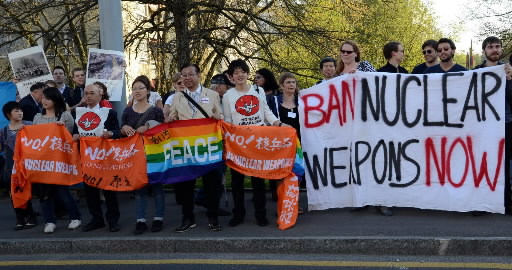A-bomb survivors stage protest in Geneva over Japanese government’s rebuff of joint statement against nuclear weapons
May 7, 2013
by Michiko Tanaka, Staff Writer
GENEVA--Dismay and criticism is growing inside and outside Japan over the Japanese government’s decision not to support the joint statement on the humanitarian impact of nuclear weapons at the Second Preparatory Committee for the 2015 Nuclear Non-proliferation Treaty (NPT) Review Conference, now taking place in Geneva, Switzerland. Hiroshima Mayor Kazumi Matsui, who took part in the gathering, expressed regret over Japan’s stance. A-bomb survivors and NGO members calling for the abolition of nuclear weapons staged a protest march to the Delegation of Japan to the Conference on Disarmament.
Mr. Matsui and Nagasaki Mayor Tomihisa Taue met with Mari Amano, the Ambassador of Japan to the Conference on Disarmament in Geneva, at the European Headquarters of the United Nations, which serves as the venue for the preparatory committee. The ambassador explained, “The Japanese government was negotiating a partial revision of the statement, but time ran out.” Following the meeting, Mr. Matsui described his dissatisfaction, saying, “The statement shares the desire of the A-bombed cities and there was no problem with the wording. I’m not persuaded by this puzzling result.” Mr. Taue, too, expressed regret, saying, “This decision has called into question Japan’s position as the A-bombed nation.”
The protest march brought together about 70 people from 20 nations who are in Geneva in connection with the preparatory committee gathering. Starting at U.N headquarters, they marched for about 30 minutes to the Japan Delegation to the Conference on Disarmament in Geneva, chanting such slogans as “No more hibakushas.” Kunihiko Sakuma, 68, a resident of Nishi Ward, Hiroshima, said forcefully, “Hiroshima’s wish has been betrayed.”
The joint statement presented by South Africa declares: “It is in the interest of the very survival of humanity that nuclear weapons are never used again, under any circumstances.” While 74 nations chose to back the statement, Japan was not among them, urging that the words “under any circumstances” be removed from the final document.
South Africa and Switzerland had sought to persuade Japan to lend its support to the statement by omitting language which mentioned making nuclear weapons illegal. It is believed that the Japanese government balked at signing the statement over concerns that this would adversely affect the U.S. nuclear umbrella in the midst of North Korea’s drive to advance its nuclear and missile development programs.
(Originally published on April 26, 2013)
GENEVA--Dismay and criticism is growing inside and outside Japan over the Japanese government’s decision not to support the joint statement on the humanitarian impact of nuclear weapons at the Second Preparatory Committee for the 2015 Nuclear Non-proliferation Treaty (NPT) Review Conference, now taking place in Geneva, Switzerland. Hiroshima Mayor Kazumi Matsui, who took part in the gathering, expressed regret over Japan’s stance. A-bomb survivors and NGO members calling for the abolition of nuclear weapons staged a protest march to the Delegation of Japan to the Conference on Disarmament.
Mr. Matsui and Nagasaki Mayor Tomihisa Taue met with Mari Amano, the Ambassador of Japan to the Conference on Disarmament in Geneva, at the European Headquarters of the United Nations, which serves as the venue for the preparatory committee. The ambassador explained, “The Japanese government was negotiating a partial revision of the statement, but time ran out.” Following the meeting, Mr. Matsui described his dissatisfaction, saying, “The statement shares the desire of the A-bombed cities and there was no problem with the wording. I’m not persuaded by this puzzling result.” Mr. Taue, too, expressed regret, saying, “This decision has called into question Japan’s position as the A-bombed nation.”
The protest march brought together about 70 people from 20 nations who are in Geneva in connection with the preparatory committee gathering. Starting at U.N headquarters, they marched for about 30 minutes to the Japan Delegation to the Conference on Disarmament in Geneva, chanting such slogans as “No more hibakushas.” Kunihiko Sakuma, 68, a resident of Nishi Ward, Hiroshima, said forcefully, “Hiroshima’s wish has been betrayed.”
The joint statement presented by South Africa declares: “It is in the interest of the very survival of humanity that nuclear weapons are never used again, under any circumstances.” While 74 nations chose to back the statement, Japan was not among them, urging that the words “under any circumstances” be removed from the final document.
South Africa and Switzerland had sought to persuade Japan to lend its support to the statement by omitting language which mentioned making nuclear weapons illegal. It is believed that the Japanese government balked at signing the statement over concerns that this would adversely affect the U.S. nuclear umbrella in the midst of North Korea’s drive to advance its nuclear and missile development programs.
(Originally published on April 26, 2013)








